An Energy Performance Certificate is a legal requirement whenever a property is built, sold or rented, but what is it and what does it show?
Since October 2008, legislation under the Energy Performance of Buildings Directive, has made it illegal to market a standalone building, over 50m2 without a valid EPC. You must order an EPC for potential buyers and tenants before you market your property to sell or rent.
They are valid for 10 years unless there have been any substantial structural changes.
It is now approaching the 10-year anniversary of the legislation, we advise you to check your property’s EPC expiry date to ensure you stay compliant.
What is Energy Performance Certificate?
An EPC measures the energy efficiency of a building, which is represented on a scale from A (most efficient) to G (least efficient). It contains information about a property’s energy use and typical energy costs, along with recommendations about how you can reduce energy use and save money.
To complete an EPC, an accredited Energy Assessor will visit your property and conduct a visual survey. The Energy Assessor will undertake a measured survey and take photographs, recording various aspects of the property including the windows, lights, heating and radiators to help calculate the properties EPC rating.
Why are they important?
An EPC is important to landlords and prospective buyers/tenants as they show how energy efficient a property is. This can be a key deal breaker for prospective buyers/tenants, as if the property has a low rating, the prospective buyer/tenant will know that energy bills for that property could be high.
Without a valid EPC, you could be fined up to £5,000.
Legislative Changes
In April 2018, new legislation known as Minimum Energy Performance Standards (MEPS), also known as Minimum Energy Efficiency Standards (MEES) came into force making it unlawful to let a property with an EPC rating of F or G.
From experience, we have found that buildings with a current EPC rating of E may also be affected by the MEPS legislation, as if no works have been completed on the property, it may fall below the minimum standards upon re-assessment. This is because since EPC legislation was introduced in 2008, there have been changes to the way an EPC is calculated.
How can we help?
At Compliance365, we have vast experience with working with various clients across both the public and private sectors, providing advice and guidance around both EPC and MEPS legislation.
If your property is found to achieve an F or G EPC rating, we can help you to determine the most cost-effective and easiest upgrades to increase your property’s rating.
To find out more about how we can help you, click here. Alternately, you can send an email to sales@compliance365.co.uk and a member of our team will get back to you.

